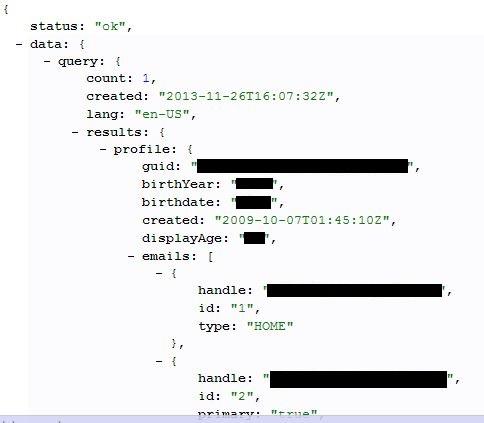申請
[1] 到Yahoo! Developer Network登入後 -> 右上角 My Projects -> Create a Project
[2] 申請好會有一組 Application ID, Consumer Key, Consumer Secret
[3] 填入 domain 後記得驗證它, 才能用於線上
登入 Oauth, 並透過 yql 取得使用者資料 (使用 Codeigniter)
Oauth
原先 Oauth 那邊打算使用官方的 SDK, 但是怎麼試都會有 ERROR, 於是參考網路的資源重刻了一個輪子
YQL
原以為做登入 Oauth 取得的 GUID 再透過 YQL Console 的結果網址就可以取得使用者資料, 而不透過 YQL 的 SDK
例如我想取得使用者資料 YQL Console 執行
select * from social.profile where guid = "{我的GUID}"
完成後頁面下面有 url : http://query.yahooapis.com/v1/public/yql?q=select%20*%20from%20social.profile%20where%20guid%20%3D%20%22{我的GUID}%22&format=json&diagnostics=true&callback=
果然事情不是憨人想得這麼簡單, 直接拿來用會得到 ERROR 頁面
{
error: {
lang: "en-US",
diagnostics: null,
description: "Authentication Error. The table social.profile requires a higher security level than is provided, you provided ANY but at least APP is expected"
}
}
YQL Console 頁面應該是塞了 Token, 所以只好使用正統的方法來取得了
我們要使用 Yahoo! Social SDK 請將 yos-social-php 下載到 /application/third_party, 稍後的 Library 會引入它
此練習只是取得使用者資料為例子, 取得 YQL 其它資料應該也是差不多
Oauth Library :
<?php defined('BASEPATH') OR exit('No direct script access allowed');
class Oauth {
const CONSUMER_KEY = "(填你自己的)";
const CONSUMER_SECRET = "(填你自己的)";
const APP_ID = "(填你自己的)";
const CALLBACK_URL = "http://{你的 domain}/{你的 controller}/get_access_token";
private $TOKEN;
public function curl_post($url, $post = NULL, $options = array()) {
$defaults = array(
CURLOPT_POST => 1,
CURLOPT_HEADER => 0,
CURLOPT_URL => $url,
CURLOPT_FRESH_CONNECT => 1,
CURLOPT_RETURNTRANSFER => 1,
CURLOPT_FORBID_REUSE => 1,
CURLOPT_TIMEOUT => 4,
CURLOPT_POSTFIELDS => http_build_query($post),
);
$ch = curl_init();
curl_setopt_array($ch, $defaults);
if( ! $result = curl_exec($ch))
{
trigger_error(curl_error($ch));
}
curl_close($ch);
return $result;
}
public function get_request_token()
{
$post = array(
"oauth_nonce" => md5(uniqid(rand(), true)),
"oauth_timestamp" => time(),
"oauth_consumer_key" => OAUTH::CONSUMER_KEY,
"oauth_signature_method" => "PLAINTEXT",
"oauth_signature" => OAUTH::CONSUMER_SECRET."&",
"oauth_version" => "1.0",
"oauth_callback" => OAUTH::CALLBACK_URL,
);
$r = $this->curl_post("https://api.login.yahoo.com/oauth/v2/get_request_token", $post);
parse_str($r, $output);
return $output;
}
public function get_access_token($data)
{
if ( ! isset($data) || ! is_array($data))
{
return FALSE;
}
$post = array(
"oauth_nonce" => md5(uniqid(rand(), true)),
"oauth_timestamp" => time(),
"oauth_consumer_key" => OAUTH::CONSUMER_KEY,
"oauth_signature_method" => "PLAINTEXT",
"oauth_version" => "1.0",
"oauth_signature" => OAUTH::CONSUMER_SECRET."&". $data["oauth_token_secret"],
"oauth_token" => $data['oauth_token'],
"oauth_verifier" => $data['oauth_verifier'],
);
$r = $this->curl_post("https://api.login.yahoo.com/oauth/v2/get_token", $post);
parse_str($r, $output);
return $output;
}
public function refresh_access_token($data)
{
if ( ! isset($data) || ! is_array($data))
{
return FALSE;
}
$cookie = get_object_vars(http_parse_cookie(getenv("HTTP_COOKIE")));
$_COOKIE = $cookie["cookies"];
$post = array(
"oauth_nonce" => md5(uniqid(rand(), true)),
"oauth_timestamp" => time(),
"oauth_consumer_key" => OAUTH::CONSUMER_KEY,
"oauth_signature_method" => "PLAINTEXT",
"oauth_version" => "1.0",
"oauth_signature" => OAUTH::CONSUMER_SECRET."&".$data["oauth_token_secret"],
"oauth_token" => $data["oauth_token"],
"oauth_session_handle" => $data["oauth_session_handle"],
);
$r = $this->curl_post("https://api.login.yahoo.com/oauth/v2/get_token", $post);
parse_str($r, $output);
return $output;
}
/*
* api : [yos-social-php github](https://github.com/yahoo/yos-social-php)
*/
public function get_user_profile($guid = "")
{
if (empty($guid))
{
return FALSE;
}
require_once (APPPATH.'third_party/yos-social-php/lib/Yahoo.inc');
$session = YahooSession::requireSession(OAUTH::CONSUMER_KEY, OAUTH::CONSUMER_SECRET, OAUTH::APP_ID);
$user = $session->getSessionedUser();
return $session->query("select * from social.profile where guid ='{$guid}'");
}
}
Controller :
public function __construct()
{
parent::__construct();
header("Content-type: text/html; charset=utf-8");
$this->load->library('Oauth');
error_reporting(E_ALL ^ E_STRICT); // ignore php notice
}
public function get_request_token()
{
$output = $this->oauth->get_request_token();
if ($output)
{
setcookie('oauth_token_secret', $output['oauth_token_secret']);
header('Location: '. $output['xoauth_request_auth_url']);
exit;
}
$this->_output_JSON(FALSE);
}
public function get_access_token()
{
$data['oauth_token_secret'] = $_COOKIE['oauth_token_secret'];
$data['oauth_token'] = $this->input->get_post('oauth_token');
$data['oauth_verifier'] = $this->input->get_post('oauth_verifier');
$output = $this->oauth->get_access_token($data);
if ($output)
{
$this->get_user_profile($output['xoauth_yahoo_guid']);
}
$this->_output_JSON(FALSE);
}
public function get_user_profile($guid)
{
$result = $this->oauth->get_user_profile($guid);
$this->_output_JSON($result);
exit;
}
private function _output_JSON_raw($result)
{
echo json_encode(
array(
'status' => (($result) ? 'ok' : 'fail'),
'data' => (($result) ? $result : ''),
),
JSON_UNESCAPED_UNICODE
);
}
瀏覽器執行 http://{你的 domain}/{你的 controller}/get_request_token, 輸出結果如下 :

ref :
http://code.gunblues.com/2011/02/yahoo-api-oauth.html